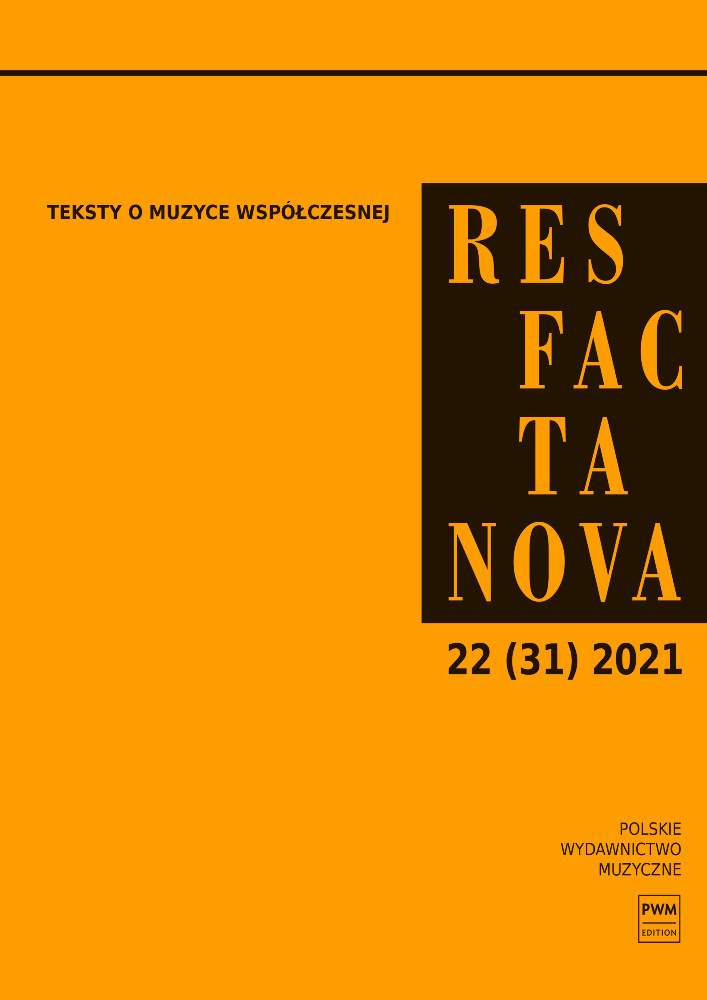Abstrakt
The article discusses the book Musical Solidarities by Andrea F. Bohlman. In her monograph she describes the history of Solidarity, placing sound at the centre of her analysis. The methods she uses allow her to examine historical facts holistically: she reaches for fieldwork as well as voice analysis, specific music motifs, and the influence of Polish musicians and composers on social attittudes in the 1980s. She offers an interesting analysis of the songs that acompanied the protests and the phenomenon of Stefan Bratkowski’s “Gazeta Dźwiękowa” [Sound Gazette] and its influence on the listeners. She draws attention to the icons of the Solidarity period such as Father Jerzy Popiełuszko, Lech Wałęsa, Krzysztof Penderecki and their voices, understood both literally and metaphorically. She also analyses contemporary reinterpretations of songs from that period, using Jacek Kaczmarski’s Mury [Walls] and Janek Wiśniewski padł [Janek Wiśniewski fell]. The author rejects the chronological approach to research, analysing the historical period through problematization of selected issues.
Bibliografia
Bohlman Andrea F., Musical Solidarities: Political Action and Music in Late Twentieth-Century Poland, Oxford University Press, Oxford 2020. https://doi.org/10.1093/oso/9780190938284.001.0001 DOI: https://doi.org/10.1093/oso/9780190938284.001.0001
Blacking John, How Musical is Man?, Faber&Faber, Lincoln 1976.
Cooper Vest Lisa, Awangarda: Tradition and Modernity in Postwar Polish Music, University of California Press, Oakland 2020. https://doi.org/10.1525/9780520975422 DOI: https://doi.org/10.1525/9780520975422
Daughtry Martin J., Listening to War: Sound, Music, Trauma, and Survival in Wartime Iraq, Oxford University Press, New York 2015, s. 33-36. https://doi.org/10.1093/acprof:oso/9780199361496.003.0003 DOI: https://doi.org/10.1093/acprof:oso/9780199361496.003.0003
Garczewski Krzysztof, Garczewska Anna, Sounds of the Opposition - Music and Politics in Poland 1970-1989, Confrontation and Cooperation, [w:] 1000 Years of Polish-German-Russian Relations, "The Journal of Kolegium Jagiellońskie Toruńska Szkoła Wyższa" 2014, t. 1, s. 45-55. https://doi.org/10.2478/conc-2014-0007 DOI: https://doi.org/10.2478/conc-2014-0007
Kerman Joseph, Jak dotarliśmy do analizy i jak z niej wybrnąć, tłum. D. Maciejewicz, "Res Facta Nova" 1994, t. 1 (10), s. 84-100.
Kunreuther Laura, Voicing Subjects: Public Intimacy and Mediation in Kathmandu, University of California Press, Berkeley 2014.
MacFadyen David, Red Stars: Personality and the Soviet Popular Song, 1955-1991, McGill-Queen's University Press, Montreal 2001.
McClary Susan, Feminine Endings: Music, Gender, and Sexuality, University of Minnesota Press, Minnesota 1991.
Moisala Pirkko, "A People to Come" in a Himalayan Village Music: A Deleuzian-Guattarian Study of Musical Performance Experiments, [w:] Musical Encounters with Deleuze and Guattari, eds. Pirkko Moisala, Taru Leppänen, Milla Tiainen, Hanna Väätäinen, Bloomsbury, New York-London 2017, s. 129-147. https://doi.org/10.5040/9781501316777.ch-007 DOI: https://doi.org/10.5040/9781501316777.ch-007
Tochka Nicholas, Pussy Riot, Freedom of Expression, and Popular Music Studies after the Cold War, "Popular Music" 2013, t. 32, nr 2, s. 303-311. https://doi.org/10.1017/S026114301300007X DOI: https://doi.org/10.1017/S026114301300007X
Šmidchens Guntis, The Power of Song: Nonviolent National Culture in the Baltic Revolution, University of Washington Press, Seattle-London 2014.
Nagranie Murów odśpiewanych przez uczestników Strajku Kobiet w Płocku w 2020 roku, https://www.youtube.com/watch?time_continue=5&v=9=-TKVC3Bs0i&feature-emb_title (dostęp: 13.06.2021).
Sikora Elżbieta, Janek Wiśniewski grudzień Polska, 1983, https://elzbietasikora.com/dziela/janek-wisniewski-grudzien-polska/ (dostęp: 13.06.2021).
Licencja
Prawa autorskie (c) 2021 Joanna Kwapień

Utwór dostępny jest na licencji Creative Commons Uznanie autorstwa – Użycie niekomercyjne – Bez utworów zależnych 4.0 Międzynarodowe.

